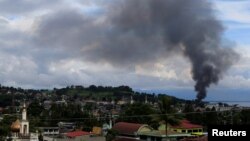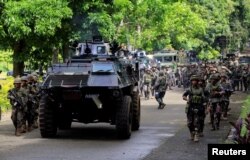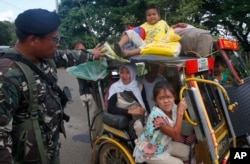Philippine officials say foreigners are among the gunmen loyal to Islamic State who seized control of the southern city of Marawi as government forces raided a suspected hideout of a wanted terrorist.
Tens of thousands of residents have fled the violence raging through Marawi, one of the biggest Muslim cities in the primarily Catholic Philippines. Marawi is on southern Mindanao island.
"What is happening in Mindanao is no longer a rebellion of Filipino citizens," Solicitor General Jose Calida said Friday. "It has transformed into an invasion of foreign fighters." He said Malaysians, Indonesians and Singaporeans were among them.
The trouble began late Tuesday, when Philippine security forces launched a mission to arrest militant leader Isnilon Hapilon. Hapilon was believed to be staying in Marawi, nursing wounds suffered from a previous clash. The militants responded to the raid by storming the city, burning down buildings, including a university and Catholic churches, and taking hostages, including a priest.
The gunmen flew black IS flags during their rampage across the city.
President Rodrigo Duterte has imposed martial law across the southern Philippines, warning he might expand it nationwide. Martial law was last declared nationwide in 1972, when then-dictator Ferdinand Marcos used it to preserve his grasp on power for over a decade.
Duterte's use of martial law has raised concerns among human rights groups, who have accused him of ordering security forces to kill thousands of people as part of his crackdown on illicit drugs.
Hundreds of people marched to the presidential palace in Manila to protest Duterte's declaration. They held banners while chanting, "Never again to martial law."
"You can see that IS is already here," Duterte said in a speech Friday at a military camp near Marawi.
Philippine troops entered Mindanao on Thursday to begin clearing out the Islamist militants.
The military says at least 11 government troops and 31 militants have been killed in the fighting.
The southern Philippine region has long been a hotbed of fundamentalist activity, including terror groups like Abu Sayyaf. The group was responsible for the 2004 bombing of a ferry in Manila Bay that killed more than 100 people. Hapilon, the former leader of Abu Sayyaf, has sworn allegiance to Islamic State leader Abu Bakr al-Baghdadi.
The United States has placed a $5 million bounty on his head for alleged terrorist acts against American citizens.







